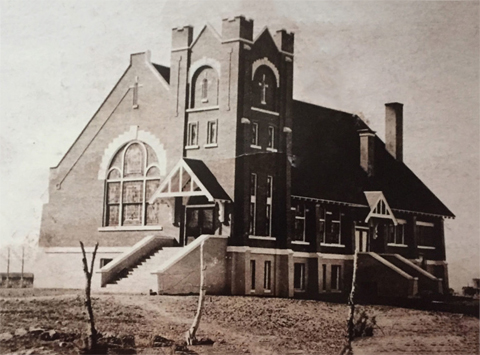CLEOPHA PROBST
Ex-Chaplain Kills Spouse, Slays Self
PALO ALTO, Calif. (AP) — A wartime Army chaplain, unemployed and sick with malaria killed his wife and himself with a butcher knife Saturday [June 1949].
The two were Reed G. Probst, 46, and Cleopha Probst, 40. The tragedy occurred on the front lawn of their bungalow in suburban Menlo Park.
Police Chief George Potter said Mr. Probst chased his wife through the house and on to the lawn at dawn and then plunged an 8-inch knife into her back. He then stabbed himself in the throat. He died with one arm over his wife’s shoulder.
The Probsts had three sons, Reed Jr., 14; Merrill, 12; and John, 8, who were at home at the time of the tragedy.
Chief Potter said Probst served 33 months in the Pacific as a chaplain with the rank of major but had done only odd jobs lately while hoping to get a chaplain’s assignment at the Palo Alto Veterans Hospital. He had been ill and despondent from a recurrence of malaria.
LIVED IN UTAH
The Probsts came to Menlo Park about two years ago from Marysville, Calif. They had previously resided in Utah.
The three boys went to a baseball game last night and returned about midnight. They said their parents were waiting up for them and appeared in good spirits.
The tragic death of Reed G. Probst and his wife at Palo Alto, Calif., Saturday stunned friends in Utah, where Mr. Probst was a seminary teacher for the Church of Jesus Christ of Latter-day Saints before World War II.
“Reed was one of the finest men I ever worked with and all of his students loved him.” said J. Karl Wood, seminary supervisor for the Church. Mr. Probst taught seminary under Mr. Wood at the South Cache Seminary in Hyrum in 1937 and 1938.
WORK ON DOCTORATE
Mr. Wood said he had talked to Mr. Probst in August, 1948, and had made a tentative agreement with him to return to the seminary system as a teacher, but that Mr. Probst had decided to settle his real estate holdings in California, at Marysville and Palo Alto, and complete work on his doctorate before returning.
Correspondence at seminary headquarters also indicates that Mr. Probst was reluctant to return to the system because of ill health believed to have included nervous disorders brought on by treatment for malaria.
Reed Gertsh Porbst was born Sept. 30, 1902, at Midway. He received his education in Wasatch County schools and graduated from Wasatch High School at Heber City. He attended Brigham Young University and later entered Utah State Agricultural College at Logan, from which he received his B. S. degree in 1930. He had served in the Swiss-German Mission of the LDS Church from 1926 to 1929.
HIGH SCHOOL PRINCIPAL
In 1930 he became principal of Tropic High School at Escalante, and in 1932 he left the position to become principal of the Escalante Seminary. From 1935 to 1937 he was principal of the seminary at Bancroft, Idaho, and in 1937 he went to South Cache.
It was in 1938 that he became chaplain for CCC camps in Utah, later moving to Montana as CCC chaplain, a position he was holding when called into active duty with the 41st division in 1941.
In the early 1930’s he was married to Cleopha Richards of Malad, Idaho, a daughter of Pres. and Mrs. Thomas W. Richards. President Richards is now presiding over the East Central States Mission of the Church.
IN AUSTRALIA
After moving into active service in 1941, Chaplain Probst[sic] trained in Australia and was present as regimental chaplain in the invasion of Hollandia, New *uinea, April, 1944. His bravery under fire was noted on several occasions in the South Pacific, and he received the nation’s third, highest award, the Silver Star.
